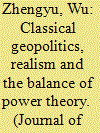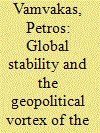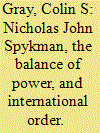| Srl | Item |
| 1 |
ID:
160636


|
|
|
|
|
| Summary/Abstract |
Since the end of World War II, classical geopolitics as a particular form of realism has been disengaged from the development of mainstream realist theories. This disengagement has not only concealed the value of classical geopolitics as a framework of analysis for policy and strategy, but also created an increasing rift between theory and policy in contemporary realist theories. This paper seeks to reengage classical geopolitics with mainstream realist theories by clarifying its realist traits and analytical characteristics, (re)stating its core propositions and probing into its potential contribution to the development of mainstream realist theories. This paper contends that classical geopolitics, while having a distinctive pedigree, can arguably be considered an integral part of the family of realist theories in view of its basic theoretical assumptions concerning international anarchy, the unit of analysis and power politics. As a framework of analysis, classical geopolitics incorporates three interrelated strategic propositions. Those three propositions not only constitute the theoretical core of classical geopolitics, but also manifest a peculiar balance-of-power conception that is essentially distinct from those proposed by mainstream realist theories. This paper argues that those three propositions combined promise to fill in prominent lacuna in the balance-of-power research programme, and also have significant implications for contemporary world politics.
|
|
|
|
|
|
|
|
|
|
|
|
|
|
|
|
| 2 |
ID:
137612


|
|
|
|
|
| Summary/Abstract |
The geopolitical game of the twenty-first century will be multilateral and multidimensional, placing great emphasis on political and commercial interests such as resources, markets, ecology, and finance than on military interests. This essay argues that the eastern Mediterranean as an area of geostrategic importance will continue to be vital to global geopolitics and that consigning it to the back burner is shortsighted. The three continents that meet at this crossroads account for almost 90 percent of the global population as well as over 60 percent of global gross domestic product.
|
|
|
|
|
|
|
|
|
|
|
|
|
|
|
|
| 3 |
ID:
141154


|
|
|
|
|
| Summary/Abstract |
Nicholas John Spykman was probably America’s finest geopolitical theorist of the twentieth century, even though he was an active participant over the course only of five years (1938–43). He is rightly viewed as a worthy intellectual successor to Sir Halford Mackinder in Britain. Spykman originated the (Eurasian) Rimland concept, which is of continuing political and strategic utility today. He was controversial and notably outspoken while his writings make it quite clear that his concern with the acquisition of power was contextualised by serious concerns for world order.
|
|
|
|
|
|
|
|
|
|
|
|
|
|
|
|